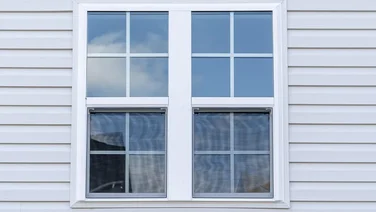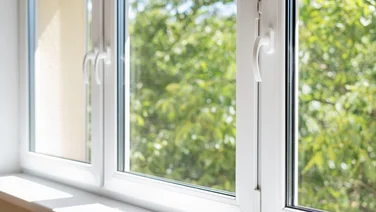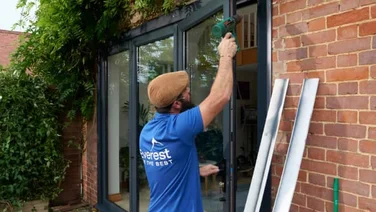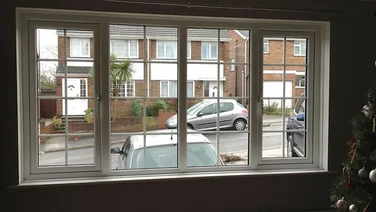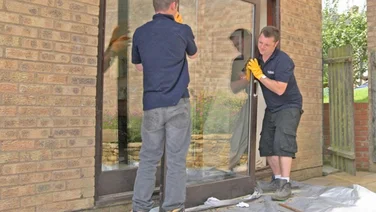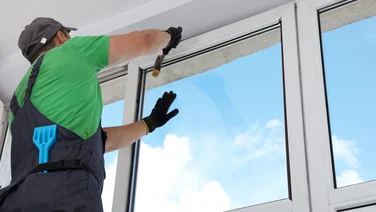✔ Double glazed porches typically cost between £2,500 and £8,000
✔ Porches under three square metres don’t need planning permission
✔ Double glazed porches can reduce drafts from external doors
Double glazed porches are a popular home improvement, and it’s not hard to see why. These attractive extensions can reduce drafts from external doors, and provide extra storage space for shoes and coats. That makes the price of double glazing on porches well worth it.
We’ll take you through the ins and outs of double glazed porches, and explain why people get them, in this article. We’ll also discuss the costs, benefits, and installation process, and let you know which homes are best suited to double glazed porches.
Interested in getting double glazed windows too? Just pop a few details into our quick form. We’ll pass them on to our trusted double glazing suppliers, who’ll get back to you with quotes.
What type of double glazing do you need?
Get started
What is a double glazed porch?
A double glazed porch is like a regular closed porch (a small extension around your front door). The only difference is that it features double glazed windows.
In some cases, double glazed porches can be made entirely of full length windows, but they often have bases made of brick or concrete, which the windows sit on top of.
Double glazed porches also feature a door– depending on your taste, this can be made of glass, wood, or another material of your choice.
How much does a double glazed porch cost?
Building a double glazed porch from scratch typically costs around £3,500 to £10,000, including installation. Installation alone usualy costs around £250 per day.
Overall, costs will vary depending on the type of porch, as well as its size, style, the materials being used, and your local area. For example, installation costs can be more expensive in certain areas of the UK, such as London.
Porches can be complex structures, which means a lot of different materials go into making the walls, windows, doors, floor, and roofing. So for simplicity’s sake, we’ve created a table with price ranges for double glazed porches, based on the primary material being used for the window frames or walls.
The price ranges in the following table are for the average three-square-metre porch, so larger porches will cost more:
Porch material | Cost |
|---|---|
uPVC | £3,500-£5,500 |
Brick | £6,000-£10,000 |
Wood | £5,500-£8,500 |
Aluminium | £3,800-£5,800 |
As you can see, double glazed porches made primarily of uPVC or aluminium are the cheapest options, whilst brick porches are the most expensive. This is partly because laying the bricks takes more time, so installation costs are higher.
Simply replacing the windows in an existing porch with double glazing costs around £640 per window. But pricing will vary greatly, depending on the size and the frame material of the window.
The style of porch you install can also affect the cost. For example, lean-to porches tend to be less expensive than regular ones, costing £3,500 to £5,000. These porches have a roof that slopes forward, away from the building. This roof type uses less material than typical porch roofs, which have two or more slopes, and so the overall costs are lower.
What type of double glazing do you need?
Get startedThe benefits of a double glazed porch
There are several benefits to double glazed porches, including:
- Draft reduction around the front door
- Improved energy efficiency for the property
- Extra security
- Added storage space
- A more aesthetically pleasing house
Daft reduction
Installing a well-insulated extension, such as a double glazed porch, in front of your home can significantly reduce drafts, especially in properties with poorly insulated external doors.
A double glazed porch acts as a buffer layer between the inside of your home and the outside, making it harder for cold air to come in through the external door.
Improved energy efficiency
Along with draft reduction, double glazed porches can improve the energy efficiency of a home by reducing heat loss – the more heat a home retains, the less energy used to heat the home. Draft-proofing doors and windows can save the average home £60 a year on energy bills, according to the Energy Saving Trust.
The added bonus of having a double glazed porch is that the external door opens into a sealed extension, which will also be well insulated with double glazing , and warmer than the outside air.
Better insulation can also improve a property’s Energy Performance Certificate (EPC). Double glazing, for example, can be enough to move a property’s EPC rating up a level, which will increase the value of the property.
Extra security
When it comes to security, two doors are better than one.
Double glazed porches make it harder for people to break into a home, since they create an extra barrier between the street and the front door. And since double glazed windows are stronger than single glazed windows, a porch that has them will be that much harder to break into.
Added space
A closed double glazed porch is basically a home extension, as opposed to a porch with no door, which is more like a shelter.
This means that a closed porch can double as an extra space to store belongings, such as coats, shoes, or even gardening equipment. Closed porches are popularly used as ‘mud rooms’ (rooms where you can leave muddy boots and outerwear), which can also help keep the inside of a home clean.
Aesthetically pleasing
Although double glazed porches aren’t everyone’s cup of tea, they can be an attractive addition to your home. They’re not only popular because of the extra insulation and security they provide, but also because they can add depth to homes with flat facades.

How is a double glazed porch installed?
A double glazed porch can take anywhere between four days and two weeks to install, depending on its size, the materials being used, and the complexity of the design.
Brick-based double glazed porches tend to take the longest to install, whilst aluminium and uPVC porches are quicker to construct.
To install a double glazed porch from scratch, the contractors will have to first lay a foundation and subflooring – the part that goes beneath the layer of material you’ll actually walk on. Contractors will usually have to excavate some ground to do this.
If your porch has a brick/concrete base or walls, they’ll begin by building this and installing the main flooring. If it’s a glass porch made of full length double glazed windows, they’ll move straight onto constructing the roof.
Once the frame of the porch has been constructed, the final step is installing double glazed windows and doors.
At this point, the bulk of the work is done. Additional – but not strictly necessary – steps can include adding light bulbs, built-in benches, or racks to the inside of the double glazed porch.
Are there any grants for double glazed porches?
There aren’t any grants specifically designed for double glazed porches – or regular porches for that matter.
However, there are several grants available for energy-efficient home improvements, such as the Home Upgrade Grant, or Home Energy Scotland. These can either cover all or part of the cost of measures, such as wall insulation or double glazed windows.
You can read about all the double glazing grants, what they cover, and their eligibility requirements on our page.
It’s unlikely that these grants will cover a new double glazed porch, but if you have a porch with single-pane windows, the grants might cover replacing them with double glazed ones.
Alternatively, if your home doesn’t already have a porch, but you want to draft proof of an external door, one of these home improvement grants might cover the costs of a double glazed door.
Is a double glazed porch worth it?
Whether a double glazed porch is worth it or not really depends on your personal goals and expectations.
If you don’t already have a porch, and your main priority is better insulation for an external door, then a double glazed porch might not be worth it. It’s much cheaper and quicker to install a new double glazed door, than to build a porch from scratch.
If your goals are purely aesthetic, a double glazed porch can be worth the spend. They aren’t extremely expensive as home improvements go, and you’ll get the added benefit of better insulation for your external door.
If your property already has a porch, but it has single glazed windows, installing double glazed ones could also be a good investment. It won’t necessarily reduce drafts within your home by much, since porches do a good job of this already, but it will improve insulation within the porch itself. This is great if you treat your porch like an extension of your house.
Double glazing can also add an extra layer of security to a porch, since double glazed windows are harder to break than single paned ones.
Is your home right for a double glazed porch?
Double glazed porches are best suited to properties with external doors that open on a large stretch of flat wall, and have extra outside space on the house.
Porches essentially act as an extension, which means you’ll need to make sure you have enough space for one. Ideally, a property should have at least four metres of space between the start of the house and the boundary of the property.
Flat walls are the best candidate for porches, mainly for aesthetic reasons. It’s technically possible to construct a porch around a recessed door (one that’s set deep into the wall, instead of being level with it), but depending on how big the recess is, the final result might look quite awkward.
Finally, the external door you want to attach a closed porch to should ideally be on the ground floor. Installing a porch around a raised door requires building regulation approval.
For this reason, homes that have front doors above ground level – accessed by steps for example – might not be the best candidates for a porch.
Do you need planning permission for a double glazed porch?
Double glazed porches do not require planning permission, as long as they are on the ground level of a property, and are less than three square metres wide and three metres tall.
They also need to be two metres away from the boundary of the property. If you are planning to construct a double glazed porch that exceeds these limits, or is not at ground level, then you will need to get planning permission.
Additionally, homeowners living in listed buildings, conservation areas, or ground floor flats will need to get planning permission, regardless of the size of the porch they want to build.
Next steps
Let’s be clear, if your priority is solely to reduce drafts from external doors, installing a double glazed door is a cheaper option.
But if you’re going to install a porch anyway – because you like the look of one, or you want the extra space – we’d recommend you get a double glazed one. Double glazing will keep the inside of your porch warmer than single glazing would, and it’s a lot stronger.
Want to speak to an installer about double glazed windows instead? Just fill in our short form with a few details, and we’ll pass them on to our network of installers. They’ll reach out to you with their best prices.
FAQs
Do porches need foundations?
All porches need foundations, typically made of concrete, to comply with building regulations. These rules exist to ensure all new structures are safe and stable.
However, the foundations don’t need to be set very deep – most porch foundations are between 45 and 1000 millimetres in depth.
Will a double glazed porch add value to your home?
Adding an enclosed double glazed porch can add value to your home for a variety of reasons. For one, it will increase the amount of floor space a home has. Plus, the inclusion of double glazing will ensure that your porch is well insulated and draft free.
All of these are attractive attributes for potential buyers.
However, the amount of money a double glazed porch will add to your home’s value will depend on the market in your local area.
Can you build a double glazed porch yourself?
We wouldn’t recommend building a double glazed porch yourself, unless you’re a qualified contractor. Enclosed porches, although small, can be complex to construct, since they require the use of many different materials.
Double glazed windows, in particular, need to be fitted correctly in order to perform well.
Hiring a professional to build your porch will not only ensure that it’s structurally sound, but also that it complies with building regulations.

